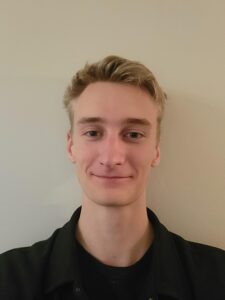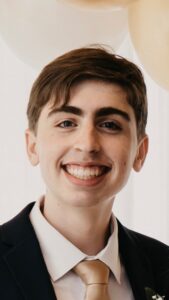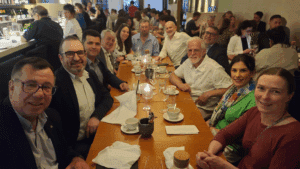Awards
About RABC | History | Leadership | Membership | Committees | Awards | Presentations | Publications
Awards
The Radio Advisory Board of Canada offers two important prizes each year:
William Taylor Scholarship in Radiocommunications
The William Taylor Scholarship in Radiocommunications is awarded annually to an engineering student who has completed (at a minimum) their second year in an accredited Canadian University, and who’s intention it is to continue their studies in pursuit of a career in telecommunications. The qualities demonstrated by this individual will be academic excellence coupled with their involvement in the industry and balanced with their contribution to their community, their family and their own personal interests. This scholarship is worth $3,500.
The William Taylor Scholarship in Radiocommunications is administered by the Electro-Federation Canada..
Applicants must:
- Be enrolled in an accredited Canadian university
- Have completed at least the second year in an engineering programme leading towards a career in radiocommunications in Canada
- Demonstrate –
- Academic excellence
- Recognized involvement with the industry in Canada
- Continuing contribution to the community at large
The application deadline is: Midnight, June 7, 2025.
Apply at www.electrofed.com
2025 Scholarship Winners are Mateo Zane and Nicholas Ashfield
The 2025 winners of the William Taylor Scholarship in Radiocommunications are Mateo Zane and Nicholas Ashfield. Congratulations to both of them.

• University of British Columbia
• Completed 2nd year of Electrical Engineering
• Cumulative Average = 85%+
• Co-op Electrical Engineering Intern at TRIUMF (Canada’s national particle accelerator center)
• Long term, Mateo aims to work on superconducting RF cavities for particle accelerators, where precision electromagnetic design drives cutting edge physics. His goal is to become a technical founder who builds companies around advanced technologies that solve invisible, high impact problems. I’m drawn to RF sensing and tomography because they make the unseen measurable. I want to take lab-based ideas like superconducting RF cavities or real time, non-invasive imaging and bring them to industry as scalable tools.
• Receiving the William Taylor Scholarship feels both thrilling and encouraging. It tells me the hours I’ve spent in the lab building RF sensors for smart pipelines and tuning telemetry on our Formula SAE car are heading in the right direction. Knowing that professionals who look after Canada’s radio spectrum see promise in my work gives me a huge boost of confidence. The funds will make a real difference too. I can finally afford fine resolution VNA and high frequence probe set that will let me shrink my fractal antenna array and push the project closer to field testing. That kind of progress would have taken months longer without this support. More than anything, the award is a reminder to keep thinking beyond my own projects. I want to share what I learn with younger students and keep looking for ways RF technology can protect infrastructure and the environment. Thank you for believing in me and for helping move these ideas forward.

• Completed 3rd year Electrical Engineering
• Cumulative average = 85%+
• He is interested in pursuing a career in radio-frequency engineering and communication systems, as this area incredibly interesting and it’s a growing field in Canada. This past summer he worked in a RF lab and gaining experience with wireless power systems and radar systems. Nicholas would like to earn a PEng, possibly pursue a Master’s degree and to continue to work in the radar and power systems field.
• I’m honoured to receive the Radio Advisory Board of Canada William Taylor Scholarship Award. This award has only increased my interest in pursuing a career in the radio-frequency and telecommunications field. This award will help me focus on his studies and enjoy his final year of my undergraduate degree.
© 2025 Radio Advisory Board of Canada
The Industry Achievement Award
The Industry Achievement Award is presented annually to an individual who has made a lasting contribution to telecommunications in Canada, either through their technical achievements or through their work in the development of policy that positions Canada as a world leader. The recipient of this award may be from industry or government.
The laureates for this award are nominated by members of the RABC and selected, usually in the early fall, by the RABC Executive Committee.
The award was inaugurated in 2004 to celebrate the Board’s 60th anniversary.
The laureates are:
2025: Jean-Yves Bernard

2024: Susan Winter

The 2024 Laureate is Susan Winter. Susan recently retired from her role as President of the Canadian Electronics and Communications Association (CECA), a role she held for nine years. She is one of the founders of CECA, which was created when several equipment manufacturers decided to create their own association. Susan had an extensive leadership career in the telecommunications industry, representing her clients at all levels of government both domestically and internationally. Known as a strategic thinker, Susan could easily develop effective relationships and identify opportunities for partnerships that would benefit all involved.
At RABC, Susan served for many years on the RABC Executive Committee as a Director, Committee Chair and as President in 2017/2018. She devoted much of her time to membership recruitment for the Board. During her tenure as President, Susan led a strategy initiative that ultimately resulted in the incorporation of RABC under the Canadian Not-for-profit Corporations Act and introduced the modern governance model that is in place today at the Board.
2023: Dr. José Costa

The 2023 Laureate is José Costa. José Costa’s career spans more than 45 years in the telecommunications industry. He received the Titles of Industrial Engineer (Electronics) and Dr. Industrial Engineer from the Universidad Politécnica de Barcelona, Spain, in 1971 and 1984, respectively, and the M.A.Sc. and Ph.D. degrees in electrical engineering from the University of Toronto, Ontario, Canada, in 1973 and 1982, respectively.
During 1977-1978. he held a fellowship in the Canadian Department of Communications (now Industry Canada) doing research on future communication services. He joined Bell-Northern Research (BNR) Ltd., Ottawa, Canada, in 1978, which in the mid-1990s became part of Nortel, where he held several positions in systems engineering. In January 2010 he joined Ericsson as part of the sale of Nortel wireless business and assets to Ericsson. He participates in the development of radio standards and spectrum recommendations in the ITU, where he is a Vice-Chairman of ITU-R Study Group 5 (terrestrial services) and Chairman of Working Party 5A (land mobile service above 30 MHz (excluding IMT); wireless access in the fixed service; amateur and amateur-satellite services), and he participates regularly in the work of Working Party 5D (IMT systems), where he is the CITEL Rapporteur. From 1999 to 2009 he was the ITU-R Liaison Official in IEEE 802.16 (wireless metropolitan area networks).
José has published over 30 technical papers in journals, conference proceedings and contributions in books, and he is a Senior Member of the IEEE. He was a frequent contributor to RABC’s own technical committees. An internationally recognized expert, José was Chairman of the ITU’s Working Party 5A at the time of his retirement.
For many years José organized a team to participate in the CN Cycle for the Children’s Hospital of Eastern Ontario, raising money to help fund programs and research for oncology patients and their families at CHEO.
2005: C. (Vino) Vinodrai, Formerly of Bell Mobility

Vino was the Co-Chairman the PCS Sub-committee of the Radio Advisory Board of Canada (RABC). He also represented Bell Mobility on various committees of the Telecommunications Industry Association (TIA), the Cellular Telecommunication Internet Association (CTIA), CDMA Development Group (CDG), and the Telecommunications Standards Advisory Council of Canada (TSACC). Vino participated in the International Telecommunications Union’s (ITU) Working Group 8 including WP 8F dealing with Systems Beyond IMT 2000. He also participated in 3GPP2.
Prior to joining Bell, he worked for over ten years for the Ontario Government. He developed the province wide Ambulance Communication Network. He also developed in conjunction with Communication Research Center the communication network for the Ontario Air Ambulance using satellite technology.
Among his notable achievements during his career were:
- Chairman of the Canadian Wireless Telecommunication Association’s (CWTA) task force on Wireless Number Portability (WNP). The Task Force produced the implementation plan for WNP in Canada.
- Building the Bell University Laboratories into a national research network. This brought synergy between research projects being conducted across Canada in various universities.
- Successfully working with international vendors and service providers in resolving the 3G standard issues. The result being the approval by International Telecommunication Union (ITU) of the IMT2000 standards (or also known as 3G or UMTS). This has enabled the wireless industry to introduce advanced applications to the consumers.
- Editor of the User Requirement Document for Personal Communication Service for North America
- Seconded by Ontario Premier’s Office to Papal Task Force and various Royal Visits to co-ordinate telecommunication activities
- Implementing the first mobile data terminals in a police force in Canada (Ottawa Police Service)
He is a member of the Institute of Electrical Engineers, Professional Engineers of Ontario (PEO), European Engineer, and the Institute Electrical and Electronics Engineers
Vino completed his high school education in Singapore and obtained his degree in Electrical Engineering from the University of London, United Kingdom. He migrated to Canada in 1973 to set up a radio system engineering group for Pye Telecommunication.
2004: Dr. Veena Rawat, President of the Communications Research Centre

Dr. Rawat also has extensive experience working with senior officials of Canadian organizations (e.g., Radio Advisory Board of Canada, Canadian Wireless Telecommunications Association, Electronic Federation of Canada), and has led Canadian delegations and negotiations at the international telecommunication organizations of United Nations (i.e., International Telecommunications Union), the Organization of American States and with the United States Government (e.g., Federal Communications Commission and National Telecommunications and Information Administration). From the mid-nineties to March 2003, she was co-Chair of the Canada/US Committee to negotiate spectrum use along the border.
Dr. Rawat has chaired many technical committees of Canadian and international organizations that deal with radio, spectrum and telecommunications issues and standards. In 2003, she became the first woman to chair the World Radiocommunication (WRC) Conference of the United Nations’ telecommunication organization for which she was awarded a gold medal by the Secretary General of the ITU. Her efforts and contributions have led to a significant increase in the representation and recognition of women in leadership roles in these national and international organizations. She continues to be involved in activities that encourage and increase the number of women in science and technology.
Dr. Rawat migrated to Canada from India in 1968 and was the first woman to graduate with a Ph.D. in Electrical Engineering from Queen’s University in 1973.
Her work has garnered her much recognition, including the Canadian Women in Communications (CWC) Woman of the Year Award, the CWC Trailblazer Award, the Queen Elizabeth Golden Jubilee Commemorative Medal, Industry Canada’s Excellence in Leadership Award, and ITU’s gold and silver medals for her contributions in the international arena. Dr. Rawat was also conferred with honorary fellowship of Broadcast Engineering Society of India and recently received the International Leadership in Government Award from the Wireless Communications Association International in the U.S.
